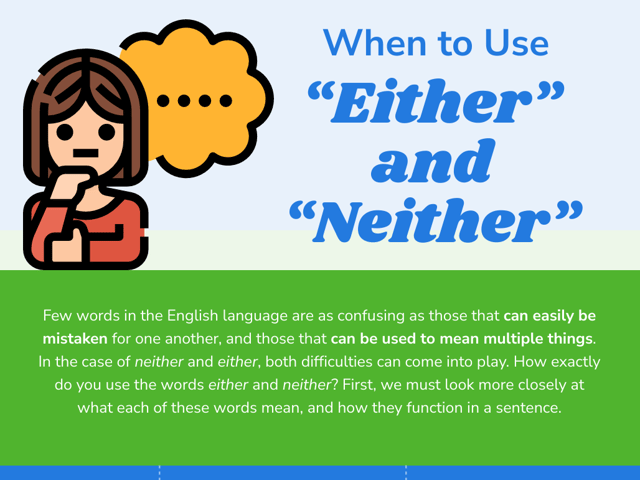
When to Use “Either” and “Neither”
Few words in the English language are as confusing as those that can easily be mistaken for one another, and those that can be used to mean multiple things. In the case of neither and either, both difficulties can come into play. How exactly do you use the words either and neither? First, we must look more closely at what each of these words mean, and how they function in a sentence.
Neither As an Adverb
When neither is used as an adverb, it indicates that a negative statement or situation applies to another noun. What does this mean, exactly? Essentially, using neither as an adverb dictates that the description in question is negative, in tandem with something else. This can be seen in the following sentences:
“I was not able to go to the concert. Neither was my brother.”
As you can see, the word neither is being used to pair the speaker and the speaker’s brother’s inability to attend a concert.
Neither As a Determiner
Neither as a determiner (or pronoun) denotes that two or more options are similarly negative. Illustrated in a sentence, neither as a determiner may look something like the following: “Neither car veered from their course, and they crashed together in a fantastic, if grisly, display.”
This is the more uncommon way to use the word neither, and it is also the form that is most often incorrectly used.
Either As an Adverb
When used as an adverb, either is used to link two negative feelings or statements. When used in a sentence, it looks something like this:
“I don’t like cats and my brother doesn’t either.
Note that the topic in question must be negative; you cannot say, “I like cats and my brother does either,” right? You’d say “I like cats and my brother does too.” When you see the word “either,” it is safe to assume that the question or topic is going to be negative in nature.
Either As a Determiner
When it is used as a determiner or pronoun, the word either is used to mean that something is interchangeable, or virtually indistinguishable. This can be seen in the following exchange:
“Do you want water or tea?”
“Either one.”
In the sentence, Either one, the speaker is suggesting that they do not have a strong opinion about the beverages being offered, or that the beverages are interchangeable. They do not matter. This is arguably the most common way to use the word either, and it is typically seen as the easiest way to use the word, as well.
Using Neither/Nor and Either/Or
Now that we have covered what each of the words mean, let’s take a closer look at exactly how the words and their accompanying words should be used in practical applications. It is important to know that the word neither should be accompanied by nor, while the word either should be accompanied by or. In practice, this looks like the following:
“Neither the dog nor the cat were listening to their owner’s supplications for peace.”
and
“Either you stop squabbling right this moment or no one gets a treat.”
The terms pair with nor and or when they are being used to address multiple nouns. In the sentence, “Neither should you,” nor is not necessary, because only one noun is being addressed (you). In the sentence “Either one,” either is being applied to a single noun (one), which means it can go without an or.
Although the words “neither” and “either” can initially seem overwhelming or confusing, understanding the parts of speech they qualify as and how those parts of speech are used will help you gain confidence as you use them—both in writing and in verbal communication.

Keep Reading

HiSET Test Blog
Must-Know Science Formulas for the HiSET Test
Achieving proficiency in science can be challenging. If you’re studying…

HiSET Test Blog
Is the HiSET Easier Than the GED?
Over 2 million 16-24-year-olds in the U.S. lack a high school education…

HiSET Test Blog
The HiSET vs the GED: What’s the Difference?
There are several exams that can be taken as an alternative to receivin…